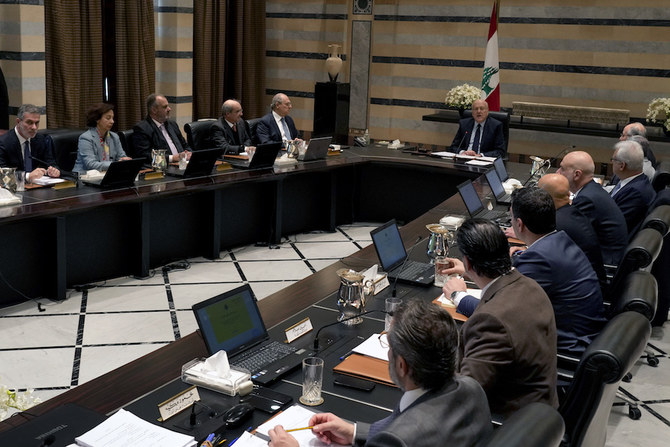BEIRUT: The Lebanese caretaker government held its second session amid the presidential vacuum on Wednesday.
The ministers of the Free Patriotic Movement boycotted the session, arguing that a caretaker government has no right to hold sessions to manage the country’s affairs.
The session was attended by 17 ministers, including seven of 12 Christian ministers. Hezbollah’s ministers also attended after being given permission by their leader, Hassan Nasrallah.
In total, six were absent — the ministers of defense, foreign affairs, energy, emigrants, social affairs and justice.
The caretaker Prime Minister, Najib Mikati, persuaded Economy Minister Amin Salam and Tourism Minister Walid Nassar to attend. Both are affiliated with the FPM but are not official members.
He also persuaded Kamal Hayek, chairman of the board of directors of Electricité du Liban, to attend despite FPM’s influence over the Energy Ministry.
Mikati, who has been fiercely criticized by the FPM for holding Cabinet sessions, said their only purpose was to serve citizens during a national crisis.
The Cabinet approved two treasury advances. The first for $62 million will pay for fuel from ships already waiting at sea. The treasury has had to pay fines on the shipments already.
The second, for $54 million, is intended to pay for the maintenance of Lebanon’s power stations.
Mikati said afterwards that the government needed to take steps to protect food security by getting cash for essentials such as wheat. Such needs cannot be postponed for sectarian and political ends, he said.
“Any government action in the future will be consistent with the logic of the constitution and safeguarding partnership. It does not seek to challenge or provoke any party,” he said.
He said all in parliament must come together to solve the nation’s problems, not least choosing a new president.
“The essence of partnership and respect for the constitution would be for everyone to assume national responsibility; hence our call to quickly move forward toward consensus in order to elect a president capable of bringing together the Lebanese before it is too late.”
Political squabbling however continued as parliament prepared on Thursday for an 11th attempt to elect a new president.
The head of the Lebanese Forces, Samir Geagea, accused Hezbollah and its allies of obstructing the process.
He also said parliament speaker Nabih Berri was helping the bloc disrupt the voting sessions in an attempt to wear down MPs and force through their preferred candidate.
“We will not accept this, and we will consult all parties to agree on a sovereign president,” Geagea said.
The Council of Maronite Bishops urged MPs to assume their responsibilities to prevent the country’s collapse.
Under the Lebanese constitution, a Maronite usually assumes the presidency, while others are given key roles including the leadership of the army, the governorship of the Banque du Liban and senior judicial positions.
The council said it was concerned there was an attempt to create a vacuum in the Maronite positions in particular, and the Christian positions in general, to change the nation’s identity.
Public school teachers meanwhile held sit-ins in protest at going unpaid, saying the situation was so perilous that many of them could not cover the cost of traveling to work.
Donor countries have so far refused Ministry of Education appeals for help.


























